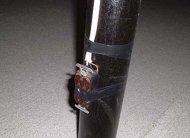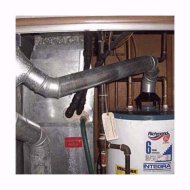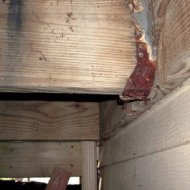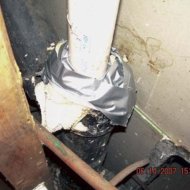
killer house
We love our homes. They provide us with warmth, shelter and, best of all, security. That's why it's so darn shocking when they turn against us. Like it or not, a house can be a virtual arsenal of lethal weapons. Whether its poisonous gasses, fiery flames, rabid bats or electrocuting appliances, even the sweetest Colonial Revival can be as armed and dangerous as Rambo on a bad day. Here are 4 ways our home sweet homes can take us down. -Keith Pandolfi
See more ways your home can be deadly at thisoldhouse.com.

electrical
1. Uncontrolled Electrical Currents
If old Ben Franklin only knew the careless way some of us deal with electricity these days, he would've kept his discovery to himself. Whether it's overwhelming a frayed extension cord with holiday lights, or exposed outlets like the one taped to a conductive metal support in this flood-prone basement, home electrocutions account for around 1,000 deaths each year in the U.S alone. At the least this homeowner could have used a GFCI receptacle so any power surge would switch it off. But if you don't know what you're doing, for Pete's sake, call up a licensed electrician.
MORE: Check out the deadliest wildlife home invaders-including rattlesnakes, scorpions, and bears-and how to get them before they get you

gas
2. Deadly Odorless Gas
We all go to sleep at night, but each year 170 of us never wake up thanks to this silent killer. The culprit: carbon monoxide poisoning caused by malfunctioning fuel burning appliances such as furnaces, ranges, water and room heaters. One way to protect yourself is to make sure you vent the exhaust of these appliances properly. That means having the pipes angle up, not down, as these folks have done-hot air rises, you know-and checking that vents are free of cracks and gaps. And most importantly: install a standard carbon monoxide detector. They only cost 20 bucks and are the best way to protect your family.
MORE: Believe it or not, your home could be making you infertile. Common solvents, carpet padding, laptops, and more culprits are to blame

deck
3. Decomposing Decks
Be warned! If the brackets and fasteners holding your deck together are as corroded as this one, your backyard paradise is in serious danger of turning into a pile of tinder sticks. Water and weather can take a toll on metal fasteners and joist hangers. Even treated decking lumber can react negatively with them, leading to corrosion and-worst-case scenario-failure.
Between 2000 and 2008, about 30 people were killed in deck collapses. So it's important to inspect yours regularly, and replace corroded metal hardware with stainless steel or hot-dipped galvanized fasteners and joist hangers. They're more rust-resistant and neither will react negatively with the copper in treated woods. Doing so will give you peace of mind the next time your plus-sized pals come over for a few cold ones on the deck.
MORE: These poisonous garden plants have got to go if you have kids and pets playing in your yard

METHANE
4. Menacing Methane
A build up of sewer gases in your home doesn't just create a foul odor reminiscent of a hot-summer-day cow pasture. Inhaling the methane that is contained in it (itself an odorless gas) can also lead to headaches, difficulty concentrating, and heart palpitations. What's worse: if enough methane accumulates in your home, the simple flicker of a pilot light can cause it to ignite. If you smell sewage, check your bathroom vent pipe (or "stink pipe") and make sure it doesn't have any holes or loose connections. And no, using duct tape and a terrycloth towel to seal it, like this homeowner did, is not the way to go.
See the complete list of how your home is trying to take you out on thisoldhouse.com!
Also on thisoldhouse.com:
World's Weirdest Home News
Home Inspection Nightmares
Laws You Didn't Know You Were Breaking
No comments:
Post a Comment